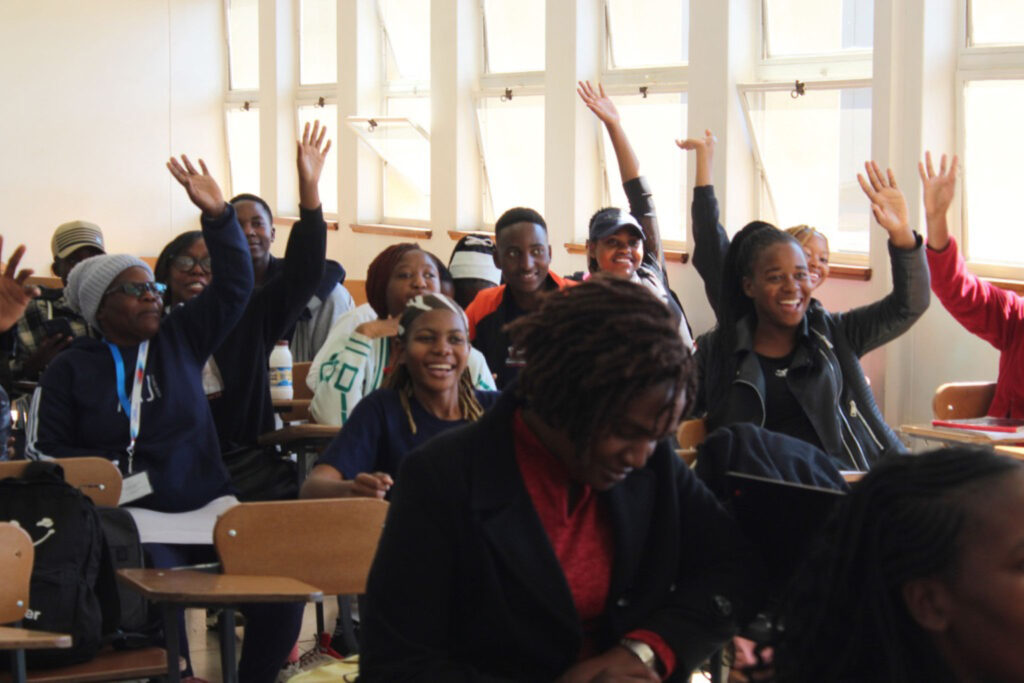
APODISSI, SIMUKAI, and the Harare Institute of Public Health organised dedicated design thinking sessions with Vocational Training Schools trainers and trainees in Namibia and Zimbabwe. While each session was different, they all aimed to gather perspectives on climate challenges and explore how sustainability education can be integrated effectively into learning environments through digital tools and key competencies.
A central component of the SUSTAIN-IT initiative is the development of an e-toolbox and an environmental analysis content module for trainers and trainees across Africa. To ensure relevance and impact, a pilot study in the target locations is necessary to gain a deeper understanding of local needs and challenges.
In Namibia, on 8th and 13th May 2025, APODISSI organised the online session for the trainers and trainees of Clocknet Vocational Training Center in Windhoek and Okahoa branches, Namibia. Margherita Trestini, General Manager, APODISSI, moderated the session, which was facilitated by Ms. Helmi Iikondja, Foundation Manager of Clocknet VTC, and Zainab Suleiman, Junior Communication and Dissemination Specialist, APODISSI.
These sessions were segmented in to two, the first focusing on exploring their perception and the second addressing education and competency challenges in technical and vocational education and training (TVET).
Interestingly, several trainers and students demonstrated a clear understanding of climate change and its effects on the environment. Many reported having encountered and experienced various environmental issues such as flood, droughts, gradual change in season, excessive rainfall, environmental pollution and their associated impacts. However, despite this awareness, many participants exhibited a limited understanding of how their daily actions and behaviours may contribute to these environmental problems. Moreover, there is a gap in awareness and usage of specialised digital tools or software designed for environmental monitoring and sustainability-related applications.
This gap highlights a crucial need for increased education on the connection between human activities, ecological degradation and environmental monitoring.
Integrating environmental education into every field of study within Vocational Training Centres (VTCs) and offering it as a course will help close the current gap in environmental knowledge and raise awareness among youth.
In Zimbabwe, SIMUKAI and the Harare Institute of Public Health conducted the design thinking sessions in two different schools.
According to SIMUKAI, learners acknowledged the reality of climate change, identifying human activities as major contributing factors. Initially, there was limited understanding of when and how to address environmental problems within their specific vocational fields. However, through discussions and group engagement, participants unanimously agreed that the challenges should be addressed as cross-cutting themes integrated at all levels of education.
Despite this consensus, their current curricula do not consistently incorporate environmental topics across all vocational courses. Additionally, adolescent girls and young women face limited access to institutions due to long distances, a situation worsened by poor internet connectivity in rural areas and the lack of digital learning tools.
The Harare Institute of Public Health reported that participants demonstrated a basic understanding of environmental problems, recognising fossil fuel combustion and greenhouse gas emissions as the major causes of climate change. However, they also highlighted significant challenges, including limited teacher training in sustainability, a lack of teaching resources, and broader competency gaps, particularly in under-resourced schools. The participants expressed a strong willingness to address environmental issues through both education and local action.
Thanks to the SUSTAIN-IT Project, there is now an increased level of interest and curiosity among the trainers and trainees in both countries regarding environmental monitoring for sustainability. While the trainers are eager to receive training from the SUSTAIN-IT Project, students are also excitedly looking forward to the availability of environmental monitoring modules. They anticipate accessible, free resources that will empower them to protect their environment, promote sustainability, and safeguard ecosystems for the future.